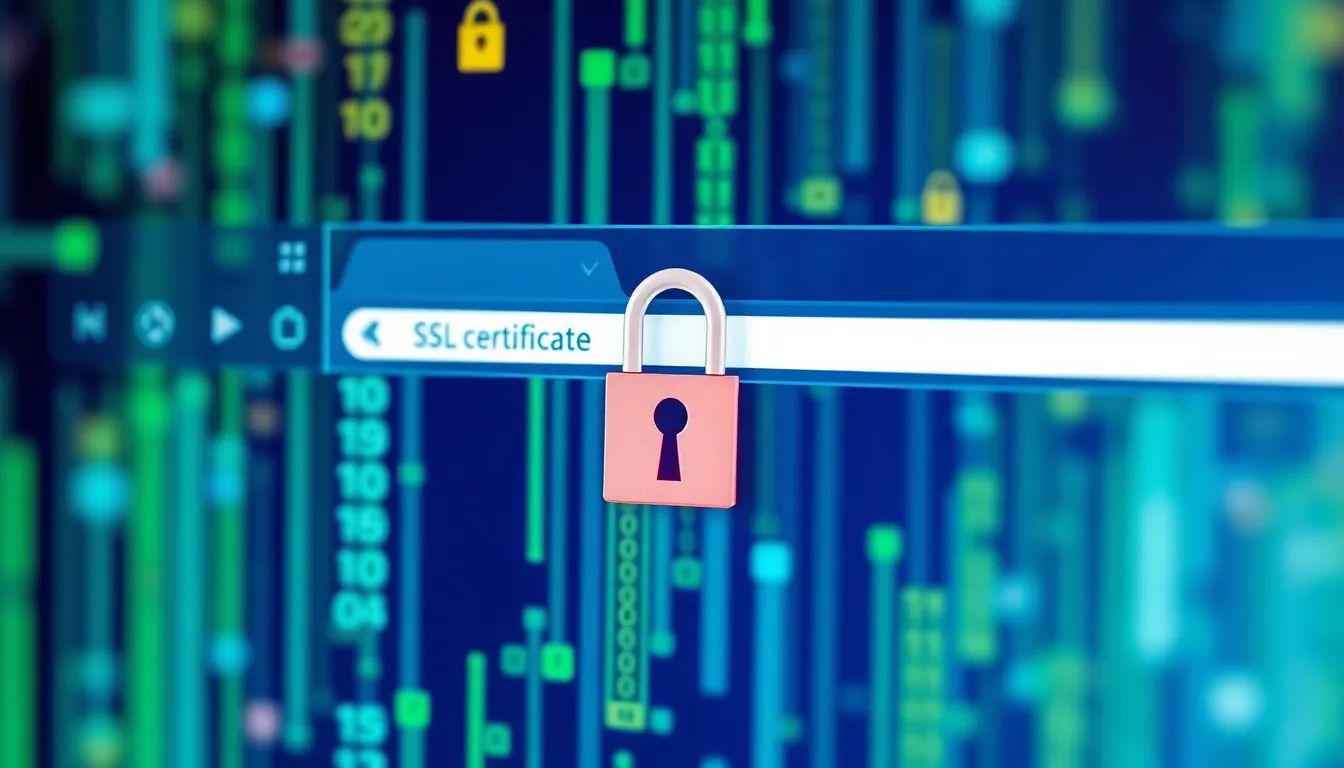In today’s digital landscape, online security is more crucial than ever. An SSL certificate plays a vital role in protecting sensitive information exchanged between users and websites. This encryption technology not only safeguards data but also boosts trustworthiness, making it essential for any business operating online.
When a website has an SSL certificate, it signals to visitors that their data is secure, encouraging them to engage without fear. As cyber threats continue to evolve, understanding the importance of SSL certificates becomes imperative for anyone looking to maintain a safe online presence. Whether you’re running a small blog or a large e-commerce site, implementing SSL is a step toward ensuring both security and credibility.
Table of Contents
ToggleWhat Is An SSL Certificate?
An SSL (Secure Socket Layer) certificate is a digital certificate that authenticates a website’s identity and enables an encrypted connection. SSL certificates play a crucial role in ensuring secure data transmission between users and websites.
Definition and Purpose
An SSL certificate provides website authentication by establishing a secure connection, ensuring data integrity and confidentiality. The primary purpose of an SSL certificate is to encrypt sensitive information, such as credit card numbers and personal data, preventing unauthorized access during transmission. SSL certificates also enhance consumer trust, leading to higher conversion rates and improved user engagement.
Types of SSL Certificates
Different types of SSL certificates cater to various needs:
- Domain Validated (DV) SSL Certificates
DV certificates validate domain ownership with minimal verification, offering basic encryption for individual websites or small businesses.
- Organization Validated (OV) SSL Certificates
OV certificates require more extensive verification, including confirming the organization’s identity. They provide a higher level of trust, suitable for businesses and organizations handling sensitive data.
- Extended Validation (EV) SSL Certificates
EV certificates offer the highest level of validation, displaying a green address bar in browsers. They provide maximum assurance for e-commerce websites and organizations prioritizing security and trust.
- Wildcard SSL Certificates
Wildcard certificates secure a primary domain and all its subdomains. This option simplifies management for websites with multiple subdomains under a single SSL certificate.
- Multi-Domain SSL Certificates
Multi-domain certificates allow users to secure multiple domains and subdomains with a single certificate. This option benefits businesses operating several websites, streamlining SSL management.
Importance of SSL Certificates

SSL certificates play a crucial role in ensuring online security and maintaining user trust. They provide essential protection for sensitive data exchanged between websites and their visitors.
Data Encryption
Data encryption protects sensitive information during transmission. SSL certificates use Secure Sockets Layer (SSL) protocol to encrypt data such as login credentials and credit card details. Encryption ensures that even if data is intercepted, it remains unreadable to unauthorized users. Businesses implementing SSL certificates reduce the risk of data breaches, safeguarding customer information. Statistics show that 93% of internet users consider encryption a critical factor when sharing personal information online.
Trust and Credibility
Trust and credibility significantly influence user behavior on websites. SSL certificates enhance a website’s reputation by providing visual cues, such as a padlock icon in the browser’s address bar. Users recognize this symbol as a sign of security and are more likely to engage with the website. In fact, 84% of consumers indicate they will abandon a purchase if they cannot trust a website. SSL certificates not only improve search engine rankings but also promote user confidence, fostering customer loyalty and increasing conversion rates.
How SSL Certificates Work
SSL certificates establish secure connections between users and websites through encryption. Understanding their operational mechanics is vital for appreciating their role in online security.
SSL Handshake Process
The SSL handshake initiates the communication process between a client and server, establishing a secure connection. This process involves the following steps:
- Client Hello: The client sends a message to the server, indicating its supported SSL versions and cipher suites.
- Server Hello: The server responds with its chosen SSL version and cipher suite.
- Server Certificate: The server provides its SSL certificate to the client for authentication.
- Key Exchange: The client verifies the certificate, then generates a session key, encrypting it with the server’s public key.
- Server Decryption: The server decrypts the session key with its private key.
- Secure Connection Established: Both parties use the session key for encryption during the data exchange.
This handshake ensures that both parties authenticate each other and that encrypted communication can proceed securely.
Role of Certificate Authorities
Certificate Authorities (CAs) play a crucial role in the SSL ecosystem by validating the authenticity of SSL certificates. They provide the following services:
- Verification: CAs verify the identity of applicants, ensuring legitimacy before issuing SSL certificates.
- Issuance: CAs issue certificates that serve as a digital passport for websites, establishing trust.
- Revocation: CAs manage certificate revocation lists (CRLs), allowing users to check if a certificate is no longer valid.
- Trust Establishment: CAs are trusted entities, and their signature on a certificate assures users that a website is secure.
Relying on reputable CAs helps maintain the integrity of online transactions and fosters user trust in web security.
Choosing the Right SSL Certificate
Selecting an appropriate SSL certificate enhances online security and builds user trust. Various factors influence this decision.
Factors to Consider
- Type of Validation: Choose from Domain Validated (DV), Organization Validated (OV), or Extended Validation (EV) based on the level of trust required. DV certificates provide basic encryption, while OV and EV certificates offer higher degrees of validation and trust.
- Number of Domains: Consider using a Wildcard certificate for single domains with multiple subdomains or a Multi-Domain certificate to secure multiple different domains under one certificate.
- Security Level: Assess the level of encryption required. Modern SSL certificates commonly use 256-bit encryption, sufficient for most applications.
- Certificate Authority (CA): Select a reputable CA known for reliability and support. Trusted CAs ensure broader acceptance across different browsers, enhancing credibility.
- Cost and Renewal: Compare pricing structures, including initial costs and renewal fees. Note that prices often correlate with validation level and terms of service.
- Support and Management: Evaluate the level of support offered by the certificate provider. Some providers offer automated renewals and easy management tools for seamless operation.
Recommendations for Different Users
- Small Businesses: Opt for a Domain Validated (DV) certificate for cost-effective encryption and basic trust. Providers like Let’s Encrypt offer free DV certificates.
- E-commerce Sites: Choose an Extended Validation (EV) certificate. The additional trust signals, such as a green address bar, boost customer confidence during transactions.
- Large Organizations: Select an Organization Validated (OV) certificate to provide higher levels of assurance while maintaining control over multiple subdomains or domains through Wildcard or Multi-Domain options.
- Nonprofits and Educational Institutions: Consider either a DV or OV certificate based on budget constraints and the need for validation. Some organizations offer discounts for nonprofits.
- Developers and IT Professionals: Use Multi-Domain certificates when managing multiple websites on a single server. This approach reduces administrative overhead and costs.
- Any User: Regularly review SSL certificates for updates and renewals. Staying informed on best practices ensures maintained security and user trust.
Common Misconceptions About SSL Certificates
Understanding SSL certificates involves dispelling common myths that surround them. Misconceptions can lead to confusion and hinder effective online security practices.
Myths vs. Facts
- Myth: SSL Certificates Are Only for E-commerce Websites.
Fact: SSL certificates benefit all websites, regardless of their function. They ensure secure data transmission for any site that collects user information, serving as a critical security measure. - Myth: SSL Is Only About Encryption.
Fact: SSL certificates also authenticate a website’s identity, fostering trust. Users can verify that they connect to the intended site rather than a fraudulent one, enhancing overall security. - Myth: A Padlock Symbol Guarantees Safety.
Fact: While a padlock indicates an encrypted connection, it doesn’t assure overall site security. Other vulnerabilities, such as outdated software or poor coding practices, can still exist, necessitating ongoing security measures. - Myth: SSL Certificates Are Too Expensive for Small Businesses.
Fact: SSL certificate prices vary widely. Many providers offer affordable options, including free alternatives like Let’s Encrypt, making security accessible for businesses of all sizes. - Myth: All SSL Certificates Provide the Same Level of Security.
Fact: Different types of SSL certificates (DV, OV, EV) offer varying levels of validation and trust. Organizations requiring higher trust levels benefit from extended validation certificates, which demand more stringent verification processes.
Importance of Understanding SSL
Understanding SSL certificates is crucial for several reasons:
- Enhancing Online Security:
Understanding the types of SSL certificates helps organizations select the appropriate level of protection based on their needs.
- Building Customer Trust:
Recognizing the significance of SSL certificates reinforces the importance of user trust for businesses. Trust can translate to increased engagement and conversion rates.
- Compliance Requirements:
Knowing the role of SSL certificates aids in meeting regulatory compliance, such as GDPR and PCI DSS, which mandate secure handling of personal and financial data.
- Protecting Sensitive Information:
Understanding how SSL works empowers website owners to safeguard sensitive data from unauthorized access effectively.
- Staying Updated with Cyber Threats:
Awareness of SSL and emerging security trends allows organizations to adapt their security measures, ensuring robust protection against evolving cyber threats.
SSL certificates are indispensable for anyone looking to establish a secure online presence. They not only encrypt sensitive data but also build trust with users by authenticating a website’s identity. In an age where cyber threats are ever-evolving, implementing SSL certificates is a proactive step towards safeguarding both personal and business information.
By choosing the right type of SSL certificate and regularly updating it, website owners can enhance their security posture and improve user engagement. It’s clear that investing in SSL certificates is not just a technical necessity but a vital component of a trustworthy online experience.

